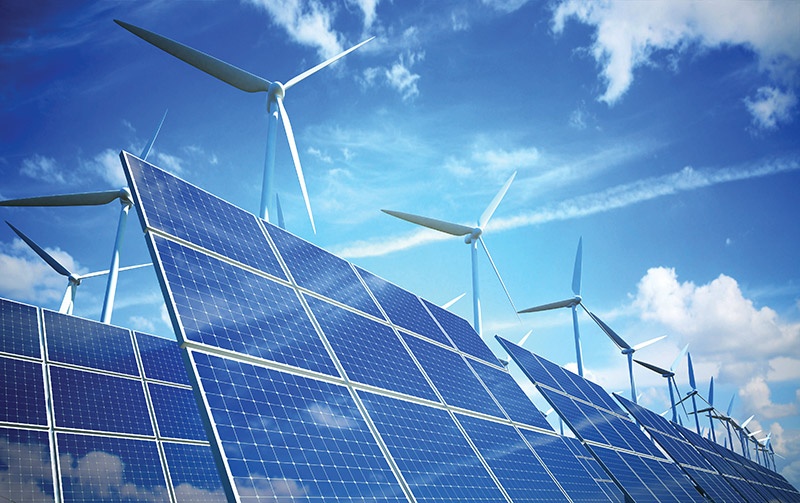Nascent green financing scene soon set for lift-off
At last week’s Hanoi roundtable themed “Finance and Governance Accelerators for a Just Energy Transition” jointly organised by Vietnam Investment Review and the United Nations Development Programme (UNDP) in Vietnam, participants said that one of the central challenges facing the country is meeting climate change and energy transition commitments, while ensuring that the nation maintains its focus on achieving the Sustainable Development Goals and ending poverty.
 |
| Nascent green financing scene soon set for lift-off |
According to the UNDP, abundant, reliable, and affordable energy supplies are essential for economic development. Meeting the growing demand for energy is a huge challenge, as the country tries to meet its COP26 commitments.
Finance is a key constraint to achieving a just energy transition. In this case, profitability and predictability are key factors in financing such a transition. The lack of these two factors limits the financing of a renewable energy project, not the other way around.
According to the World Bank’s Country Climate and Development Report (CCDR) released this month, pursuing a combined resilient and net-zero development pathway is likely to require additional investments of about 6.8 per cent of GDP per year, or a cumulative $368 billion through 2040. Investments in resilience alone would cost around $254 billion from now to 2040 in order to enable adaptation to past and future climate change.
The decarbonising pathway to meet international commitments will require another $114 billion through 2040, including $81 billion in investments and $33 billion for social programmes.
“These estimates are first orders of magnitude and should be interpreted with caution, due to uncertainties about the future evolution of technologies and other parameters, including the magnitude of climate projections, business and household behaviours, and government policies,” stated the CCDR.
According to the World Bank, the approach that is taken here is that public financing is something that can be mobilised relatively quickly given the government’s current fiscal policy stance. But government commitments can and should be bolstered by the engagement and tangible actions of the domestic private sector and through external finance, both public and private. “It is not affordable for Vietnam to finance all its adaption and mitigation measures without a contribution from external sources,” said the CCDR.
Michele Wee, CEO of Standard Chartered Bank Vietnam, told VIR, “I think that enterprises and financial institutions must work closely with each other in order to implement energy transition. Support from the government and regulators is crucial to accelerate this effort. Also, feasible mechanisms to support both banks and enterprises from the govern-ment, along with consistent and transparent policies under global practices and standards, will help projects to be effectively carried out.”
“Aspiring to be the bank of choice in Vietnam, we are focused on building a sustainable business that does not only support our clients effectively in their journey to build wealth and fulfil growth ambitions but also contribute to the sustainable development of the local economy and communities,” she said.
The Vietnamese government last year pledged to achieve net-zero carbon emissions by 2050 with its own resources and international assistance, halt investments in new coal power generation, scale up the deployment of clean power, and phase out coal power in the 2040s.
As an emerging manufacturing hub and a rapidly urbanising society, Vietnam’s demand for energy will grow rapidly over the coming three decades with transport, industry, agriculture, and construction transitioning from fossil fuels to electricity generated by solar, wind, and other renewable systems.
The UNDP said that increasing the supply of energy at affordable prices while affecting the transition from fossil fuels to renewable sources is a challenge of immense proportions. Achieving a just energy transition entails meeting this challenge while at the same time ending poverty and mitigating the impact of climate change on the most vulnerable members of society.
If renewable electricity generation is used to decarbonise the energy system as projected, the demand could increase five-fold by 2050.
According to the UNDP, Vietnam will work closely with development partners to access international financing, especially for imports of technology and equipment that cannot yet be produced locally.
However, given the required scale of investment, and the government’s commitment to maintaining fiscal balance and macroeconomic stability, it is evident that most of the capital needed will be derived from domestic sources.
Nevertheless, Vietnam’s capital markets are still too small and the number of financial instruments available is too limited to finance investment at the necessary scale. Financial development and innovation are therefore important components of a just energy transition.
The World Bank suggested that the Vietnamese government should take some actions to attract funding for the energy transition. For example, it is necessary to forcefully encourage private investment, both in new technologies and in more resilient infrastructure.
To this end, greening the financial sector will need to be prioritised. This will imply mobilising green credit by banks, developing market-based instruments such as green equities and green bonds, and applying de-risking tools (for example, insurance) and new ways to share the burden of risk between the public and private sector to encourage investment amid high levels of uncertainty.
Moreover, Vietnam should increase public funding by raising additional revenue through a carbon tax and/or by borrowing in domestic and external markets, within the limit required to avoid future debt distress for the government. What is more, Vietnam also would need to garner more revenues from international financial sources, including institutional investors and multilateral and bilateral donors, and tap into foreign direct investment and inward remittances.
Green finance is still in its infancy in Vietnam. While the State Bank of Vietnam (SBV) in 2018 approved a programme on green bank development and an action plan to realise Vietnam’s sustainable development goals by 2030, climate financing was only about 5 per cent of total financing provided by Vietnamese banks (or about 0.2 per cent of GDP) in 2020. Domestic financial institutions are in the early stages of their understanding of green bonds and other capital market instruments.
| Caitlin Wiesen-Resident representative UNDP in Vietnam
This roundtable is the first of a series of discussions we intend to hold with the government of Vietnam to clarify the most suitable policy options as the country seeks to attract finance for its transition to net zero. Along with the COP26 announcement, the Prime Minister has also approved the National Climate Change Strategy, which sets out a clear roadmap to meet net zero carbon emissions by 2050. Vietnam is faced with the impetus of maintaining high rates of economic growth while meeting climate and energy transition commitments in ways that are just. The demand for energy needed for economic growth will increase significantly. As a manufacturing hub, businesses and sectors will continue to demand energy, while at the same time shifting from fossil fuel-based energy to renewables. The challenges we have are threefold. We have to invest in renewable power generation; invest in energy efficiency and energy transition for transport, industry, construction, and agriculture; and protect workers and vulnerable people. Unpacking key factors – policy, technical, financial, social, and governance – could help accelerate a just energy transition, attract green investment, and create a conducive environment for private businesses (both national and international) to contribute. Perspectives from policy, private sector businesses, and experts in the banking sector will help identify the most pressing bottlenecks that, if unlocked, will increase the flow of finance for the energy transition. | |
| Michele Wee-CEO, Standard Chartered Bank Vietnam
It is extremely important for Vietnam to develop renewable energy, which will greatly contribute to the country’s efforts and commitment to achieve net-zero emissions by 2050. Last November, Standard Chartered Bank Vietnam committed MoUs worth up to $8.5 billion in sustainable financing for three Vietnamese businesses namely T&T Group, Geleximco Group, and Van Lang Investment and Education Management Corporation to support their sustainability goals. We believe that a green recovery will bring a lot of benefits to emerging economies like Vietnam, especially as it is playing an increasingly important role in the global economy and supply chain. In that process, the private sector has a crucial role to play. Investments like these will help Vietnam in its sustainable development journey and securing its prosperity. We remain committed to Vietnam’s recovery and future sustainable growth and look forward to working closely with the Vietnamese government, our clients and partners to support Vietnam’s sustainable development, economic recovery, and ambitious net-zero targets. Enterprises and financial institutions must work closely with each other in order to implement energy transition. Support from the government and regulators is crucial to accelerate this effort. Also, feasible mechanisms to support both banks and enterprises from the government, along with consistent and transparent policies under global practices and standards, will help projects to be effectively carried out. We have been promoting sustainable finance in Vietnam through a range of initiatives. Last year, we worked with Vietnam’s Military Bank to facilitate the funding for Tan Thuan and Hanbaram wind power projects. Earlier this year, we were one of the very first banks in Vietnam to launch Green Mortgage Loan, which offers one of the most preferential interest rates and special privileges to clients purchasing properties at green real estate projects. In partnership with the British Chamber of Commerce in Vietnam, we have been running a Sustainability webinar series to promote sustainable development in Vietnam and the application of ESG (environmental, social, and governance) among businesses. These are part of our sustainability agenda to support sustainable development in Vietnam and accelerate the world towards net-zero. It’s not just about doing the deals but bringing everyone on the journey to understand why net zero is critical and working together on transition financing. |
What the stars mean:
★ Poor ★ ★ Promising ★★★ Good ★★★★ Very good ★★★★★ Exceptional
Related Contents
Latest News
More News
- Trung Nam-Sideros River consortium wins bid for LNG venture (January 30, 2026 | 11:16)
- Vietnam moves towards market-based fuel management with E10 rollout (January 30, 2026 | 11:10)
- Envision Energy, REE Group partner on 128MW wind projects (January 30, 2026 | 10:58)
- Vingroup consults on carbon credits for electric vehicle charging network (January 28, 2026 | 11:04)
- Bac Ai Pumped Storage Hydropower Plant to enter peak construction phase (January 27, 2026 | 08:00)
- ASEAN could scale up sustainable aviation fuel by 2050 (January 24, 2026 | 10:19)
- 64,000 hectares of sea allocated for offshore wind surveys (January 22, 2026 | 20:23)
- EVN secures financing for Quang Trach II LNG power plant (January 17, 2026 | 15:55)
- PC1 teams up with DENZAI on regional wind projects (January 16, 2026 | 21:18)
- Innovation and ESG practices drive green transition in the digital era (January 16, 2026 | 16:51)



 Tag:
Tag:



















 Mobile Version
Mobile Version